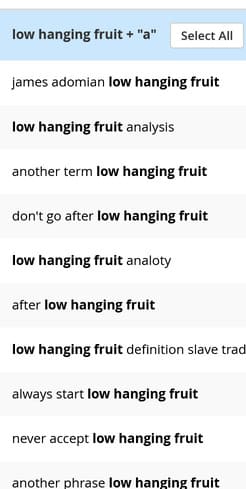What Is Low Hanging Fruit Keywords: The SEO Secret

The Secret to Unlocking SEO Success
Chasing after high-competition keywords and seeing minimal results? Yeah, it’s a common headache in the SEO world.
If you’re looking for a smarter, more efficient way to improve your rankings, you’ll want to start focusing on low hanging fruit keywords. I can hear you asking What is low hanging fruit keywords?
These keywords are essentially untapped opportunities—search terms with decent traffic potential and much less competition.
Think of them as quick wins that can drive visibility and traffic without having to wage war against the industry giants.
In this article, I’ll break down the concept of low hanging fruit keywords, outline exactly why they matter for your website’s performance, and share some practical methods for identifying them.
Adopting this strategy can seriously accelerate your SEO progress. Let’s have a deeper look into it and make some money in the process.
Click here to see my #1 recommendation for making money online
Introduction to What Is Low Hanging Fruit Keywords
When it comes to SEO, keywords are everything. And there are a lot of different strategies and opinions out there on how to target keywords.
One of the most effective and straightforward approaches is targeting low hanging fruit keywords. So, what exactly are low hanging fruit keywords?
When talking about low hanging fruit, it means it is something that is easier to do, like a problem that can easily be solved. You only need basic levels of effort and you can expect immediate results.
In short, it’s doing thing the easy way that will always work to accomplish a goal or achieve success.
When it comes to keywords, these are keywords that are easier to rank for than others. This could be because they’re less competitive, or because they’re more relevant to your business or niche.
Either way, targeting these types of keywords can be a secret weapon in your SEO arsenal. These keywords can help you to quickly and easily boost your rankings and get more traffic flowing to your website.
To help you get started with targeting low hanging fruit keywords, we’ve put together this handy guide. In it, we’ll show you how to identify these types of keywords, as well as some tips and strategies for making the most of them.
What is Low Hanging Fruit Keywords?
If you want to unlock SEO success, low hanging fruit keywords are the secret. So what is low hanging fruit keywords about and why are they so special?
They’re simply the most accessible and achievable keywords for your website. They’re also usually less competitive than other keywords and have high search volume.
These are the keywords that you have the best chance of ranking for in search engines, and they can be a great starting point for your SEO efforts.
Why are these keywords so important? Because they can help you get your foot in the door with search engines.
By ranking for these keywords, you’ll start to build up momentum and authority, which can then lead to better rankings for more competitive keywords.
So how do you find low hanging fruit keywords? There are a few different methods you can use, but one of the simplest is to just look at your competitor’s websites. See what keywords they’re ranking for and try to target those same ones.
Another method is to use keyword research tools like Google’s Keyword Planner, Ahrefs Keyword Explorer, or Moz’s Keyword Explorer. These tools will help you identify high-traffic, low competition keywords that you can realistically rank for.
Start with your main, seed keyword you want to target and use one of these programs to see what comes up. Once you’ve found some low hanging fruit keywords, it’s time to start optimizing your website for these keywords.
This means creating useful content around those keywords that is informative and engaging. Also make sure your website’s title tags, meta descriptions, and headings contain the keyword phrases you’re targeting.
By following these steps, you can start seeing real results from your SEO efforts – that is what is low hanging fruit keywords about!
Click here to see my #1 recommendation for making money online
Benefits of Using Low Hanging Fruit Keywords
To improve your SEO, you need to start with low hanging fruit keywords. These are the keywords that are easy to rank for and will help you get more traffic quickly.
There are a few benefits of using keywords that are low hanging fruit:
1. You can get more traffic quickly.
2. It’s easier to rank for these keywords.
3. You can use them to target long-tail keywords.
4. They can be a great way to test new keyword ideas.
5. You can build website authority.
6. It can increase your chances for targeted conversions.
7. You can rank your website faster using these keywords.
8. You can find these keywords using various tools and resources.
Start with low hanging fruit keywords and you’ll be on your way to better SEO!
Click here to see my #1 recommendation for making money online
How to Find Low Hanging Fruit Keywords
You have to start by brainstorming a list of potential keywords related to your business. You can use Keyword Finder, Ahrefs, keywordtool.io, or Semrush.
Once you have a list of potential keywords, use a keyword research tool to determine which keywords are most relevant to your business and fit the right criteria.
Look for keywords with a low keyword difficulty and high search value. Most keywords will have high difficulty and high search value, or the exact opposite; both difficulty and search value will be low.
Here you have to find the keywords that are low in difficulty and high in search value. These are the low hanging fruit keywords you’ll need as they are easier to target.
When you use Ahrefs to search for low hanging fruit keywords, you can also include “traffic potential”, what must be high to find the right keywords.

You can also use the Alphabet Soup Technique to find low hanging fruit keywords. You type in your keyword into the Google search bar to see what comes up.
Then you type an “a” to see keyword results all starting with the letter “a”. Next you do the same with the letter “b”, and so on. This will get you many new keywords to write content about.
Finally, create a content strategy around these keywords that you’ve identified in order to rank for those keywords and drive traffic to your website.
Don’t forget to include similar keywords in your content to make it clear for Google what your keyword is all about.
For instance, if your content is about apple, make it clear if you are talking about the edible fruit or the brand Apple.
Optimizing Your Content with Low Hanging Fruit Keywords
If you want to optimize your content for better search engine ranking, start with low hanging fruit keywords.
These are keywords that are already getting some traction and could be easily incorporated into your content to give it a boost.
To find these competitive keywords, start by looking at your Google Analytics account to see which terms people are already searching for that bring them to your site.
You can also use a keyword research tool like Google AdWords Keyword Planner or Moz Keyword Explorer to find related terms that have high search volume but low competition.
When you have a list of potential keywords, work them into your content in a way that is natural and makes sense. Don’t stuff keywords into your content just for the sake of it – this will only hurt your ranking.
Instead, focus on creating quality content that uses these keywords in a way that is relevant and helpful to your readers.
Click here to see my #1 recommendation for making money online
Strategies for Leveraging Low Hanging Fruit Keywords in SEO Campaigns
As a business owner or marketing manager, you’re always looking for ways to improve your search engine optimization (SEO) campaigns. One way to do this is by targeting low hanging fruit keywords.
In other words, these keywords with low competition are the perfect target for your SEO campaigns. Here are some strategies for leveraging them:
1. Identify Low Hanging Fruit Keywords
The first step is to identify these keywords. You can use a variety of keyword research tools, such as Google AdWords Keyword Planner and Moz Keyword Explorer.
Once you’ve identified some potential keywords, it’s important to check the competition level. You can do this using a tool like SEMrush or by doing a manual Google search.
If the top results are all from major brands, it’s likely that the keyword is too competitive and you should look for another one.
2. Create Optimized Content
When you’ve found some good keywords that are low hanging fruit, it’s time to create content that is optimized for those keywords.
This means including the keyword in the title, throughout the body of the article, and in the meta tags. However, don’t stuff your content with keywords – it should still read naturally.
3. Promote Your Content
Once you’ve created your content, you need to promote it in order to get the most out of your SEO campaign.
You can do this by submitting the article to directories, publishing it on social media platforms. You can also reach out to influencers to ask them to share it with their audiences.
By leveraging low hanging fruit keywords and following these strategies, you can improve your SEO campaigns and get more visibility for your business online. Good luck!
Click here to see my #1 recommendation for making money online
Conclusion
Hopefully you got a satisfying answer to the question What is low hanging fruit keywords?
Low hanging fruit keywords are the key to unlocking SEO success for any website or blog.
By researching and targeting these opportunities, you can ensure that your content is visible in search engine results pages and that you get the maximum exposure possible.
With a little bit of research and some creative thinking, keywords that are low hanging fruit can be used to help create a successful SEO strategy.
You can use this strategy for just about any website or blog out there. Give it a try today and see what kind of results you get!
You should also watch a video about a low hanging fruit case study, where you can see clearly how to rank an article for the chosen keyword. This is a superior approach to rank your website fast.
Thanks for reading this article about What Is Low Hanging Fruit Keywords. Put the information to work and see what kind of results you’ll get.

